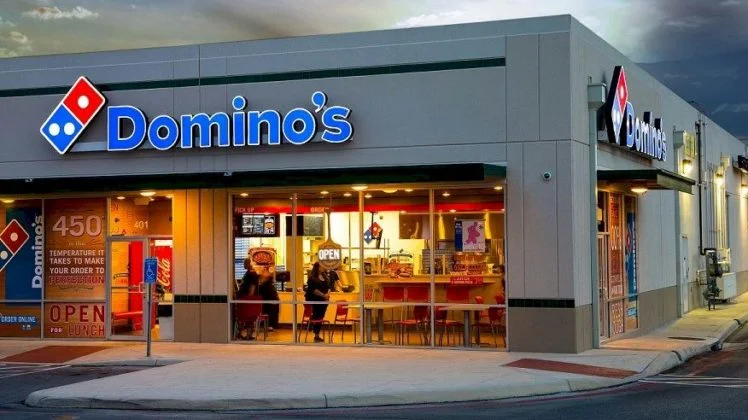Domino’s Pizza is a well-known name in the fast-food industry, particularly in the pizza segment. Established in the UK in 1985, it has grown to become a dominant player in the pizza delivery market. The brand is recognized for its commitment to quality and customer satisfaction, which has contributed significantly to its popularity. As of now, Domino’s operates over 1,000 franchise stores across the UK, employing around 35,000 people. This article delves into the intricacies of Domino’s franchise operations in the UK, exploring its history, operational model, and the factors contributing to its success.
The History of Domino’s Pizza
Domino’s Pizza was founded in 1960 by Tom Monaghan and his brother James in Michigan, USA. Initially named “DomiNick’s,” the brand was rebranded to Domino’s in 1965. The company gained fame for its innovative approach to pizza delivery, which included a commitment to delivering pizzas within 30 minutes of ordering—a promise that helped it stand out in a competitive market.
The first Domino’s store in the UK opened its doors in 1985. Since then, the brand has expanded rapidly, capitalizing on the growing demand for fast food and home delivery services. Today, Domino’s is not just a household name but also a significant player in the global pizza market.
Franchise Model of Domino’s
How Franchising Works
Franchising has been crucial to Domino’s growth strategy. The company operates through a franchise model that allows independent operators to run their own stores under the Domino’s brand. This model provides several benefits:
Brand Recognition: Franchisees benefit from an established brand with a loyal customer base.
Support and Training: Domino’s offers comprehensive training programs and ongoing support to help franchisees succeed.
Marketing Resources: Franchisees have access to a central marketing fund that promotes the brand nationally.
Initial Investment Requirements
Starting a Domino’s franchise requires a significant financial commitment. The initial investment is estimated at around £280,000, with potential franchisees needing at least £120,000 in liquid assets.
This investment covers various costs, including:
Franchise Fee: Typically between £28,000 and £32,000.
Building and Equipment: Costs can range from £100,000 to £200,000 depending on location.
Initial Inventory: Approximately £10,000 to £15,000 for ingredients and supplies.
Working Capital: Around £10,000 to £20,000 for operational expenses.
Operational Success Factors
Menu Variety and Quality
One of the key factors behind Domino’s success is its diverse menu. The company offers a wide range of pizzas with various toppings and styles, catering to different tastes and dietary preferences. Additionally, Domino’s emphasizes using high-quality ingredients in its products.
This commitment to quality has helped maintain customer loyalty and attract new customers.
Technological Innovations
Domino’s has embraced technology as part of its operational strategy. The company’s app and website facilitate easy ordering and payment processes. Approximately 75% of all sales now come through digital channels1. This focus on technology not only enhances customer experience but also streamlines operations for franchisees.
Marketing Strategies
Domino’s employs robust marketing strategies that resonate well with its target audience. The company’s campaigns often highlight promotions tied to popular events such as sports games or holidays.
By aligning marketing efforts with consumer behavior and preferences, Domino’s effectively drives sales during peak times.
Growth Statistics
Domino’s has seen substantial growth over the years. In recent years alone, it opened 95 new stores, setting a company record while employing an additional 3,300 staff members1. The brand sells over 106 million pizzas annually in the UK alone—indicative of its strong market presence.
Employment Impact
With over 35,000 employees, Domino’s plays a significant role in job creation within the UK. The company supports various employment opportunities ranging from drivers to management roles within stores. This extensive workforce reflects not only on Domino’s growth but also on its contribution to local economies.
Challenges Faced by Franchisees
While owning a Domino’s franchise can be lucrative, it is not without challenges. Franchisees must navigate various operational hurdles:
High Competition: The fast-food industry is highly competitive with numerous players vying for market share.
Operational Costs: Managing costs effectively is crucial for profitability.
Quality Control: Maintaining consistent quality across all franchises can be challenging due to varying management practices.
Conclusion
Domino’s Pizza has firmly established itself as a leader in the UK pizza market through effective franchising strategies and an unwavering commitment to quality and customer satisfaction. With over 1,000 stores currently operating across the country, it continues to thrive as one of Britain’s favorite pizza brands. The combination of strong brand recognition, technological innovation, and strategic marketing has positioned Domino’s favorably within a competitive landscape.
Related topics:
- What Can I Franchise with 10k?
- When Is Arby’s Fish Sandwich Coming Back?
- The 5 Healthiest Salads of Wendy’s

